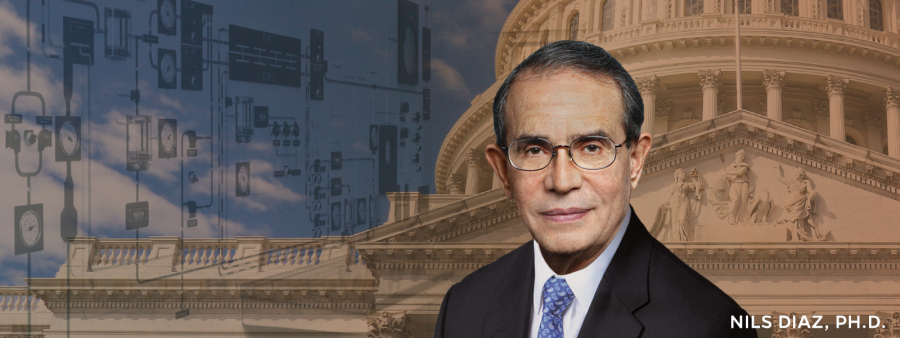Growing up in 1950’s Cuba, Nils Diaz, Ph.D. had a passion for creating better ways of doing things. He was also debating between a future in engineering, like his father before him, or following the lead of much of his family and practicing medicine. When he decided he could do both, Cuba’s worsening political unrest closed the University of Havana, the country’s only medical school. The remaining major university functioning on the island, the University of Villanova in Havana, specialized in engineering. With the choice between the two fields seemingly made for him, five years later he earned a bachelor’s degree in mechanical engineering.
After fleeing Cuba’s political unrest, Diaz and his young family soon found themselves in Gainesville, Fla. Although he had steady work as an engineer specializing in plant design, Diaz was looking for his next step. Soon, one of his former professors told him about the recently established nuclear engineering program at the University of Florida. “It’s the place to be for the future of nuclear sciences,” Diaz remembers him saying. When UF Nuclear Sciences Professor Dr. Rafael Perez offered him a spot in the program, Diaz quit his job and enrolled in September 1962. With that decision, Diaz began a 30 year career as both student and faculty of the program, establishing a lasting connection with UF that continues to this day.
Looking back at what it was like to be a part of the early years of a new and growing program, Diaz recalls the camaraderie and closeness of his fellow students – both figuratively and literally.
“We were a very close-knit group. Everyone learned from each other, and we were all excited about coming together and creating a national center for nuclear engineering. Back then everyone was at the UF Training Reactor (UFTR) building all the time, and we basically lived in the lobby of the nuclear reactor and radiochemistry lab, later attached to the Nuclear Sciences Center,” he said. On January 1, 1966, Diaz became a junior faculty member – three years before earning his Ph.D.
After graduation, Diaz put his Nuclear Engineering Sciences Ph.D. to work. His skills and interests allowed him to make the leap into the nuclear industry as a consultant and into the medical field as an Associate Professor of Medicine, specializing in cutting edge nuclear imaging techniques at both Shands and Gainesville’s Veteran’s Administration hospital. It was that type of in-the-field experience and knowledge Diaz would continue to bring back to UF throughout his three decades as a professor.
“I felt that to be the best I could be, I needed to periodically spend time outside the classroom and in the mix,” said Diaz. “Taking the opportunity to learn and stay current with the industry kept my teaching and research fresh and up-to-date.”
Even now, Diaz maintains his drive and passion for growth and breakthroughs, both personal and professional. He still provides expert policy advice, has an ownership stake in multiple startups and shows no signs of slowing down. He is also as fervent now about nuclear engineering and nuclear energy’s potential as he was in 1962.
Certain that gas prices will rise and the threat of climate change will result in more coal plants closing, Diaz predicts that the planet’s expanding power demands will eventually reinstate the need for nuclear energy by the end of the coming decade – with nuclear, wind and solar coming out on top.
“Nuclear energy will be needed as base-load power, replacing coal and competing with natural gas during the rest of this century,” said Diaz. “Nuclear energy is as clean as wind and as clean as solar, there’s no doubt about it. And the new, small modular reactors will be manufactured in factories, avoiding the high construction costs of today’s large plants.”
Over the years, Diaz’s persistent pursuit of progress and growth in both himself and his chosen professions have taken him coast to coast and around the world, from engineering student to professor to Dean of Research, from private industry and foreign government consultant to Florida’s Energy and Climate Commissioner, Director of the Nuclear Institute for the Strategic Defense Initiative and Chairman of the U.S. Nuclear Regulatory Commission – establishing domestic and international policy and regulatory practices still in practice today.
“It’s been a fun trip. I wouldn’t change my career for anything,” said Diaz.

